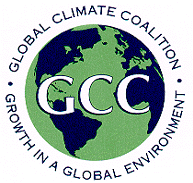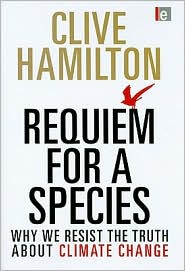Related Research Articles

Siegfried Fred Singer was an Austrian-born American physicist and emeritus professor of environmental science at the University of Virginia, trained as an atmospheric physicist. He was known for rejecting the scientific consensus on several issues, including climate change, the connection between UV-B exposure and melanoma rates, stratospheric ozone loss being caused by chlorofluoro compounds, often used as refrigerants, and the health risks of passive smoking.

The Global Climate Coalition (GCC) (1989–2001) was an international lobbyist group of businesses that opposed action to reduce greenhouse gas emissions and publicly challenged the science behind global warming. The GCC was the largest industry group active in climate policy and the most prominent industry advocate in international climate negotiations. The GCC was involved in opposition to the Kyoto Protocol, and played a role in blocking ratification by the United States. The coalition knew it could not deny the scientific consensus, but sought to sow doubt over the scientific consensus on climate change and create manufactured controversy. The GCC dissolved in 2001 after membership declined in the face of improved understanding of the role of greenhouse gases in climate change and of public criticism.

The global warming controversy concerns the public debate over whether global warming is occurring, how much has occurred in modern times, what has caused it, what its effects will be, whether any action can or should be taken to curb it, and if so what that action should be. In the scientific literature, there is a strong consensus that global surface temperatures have increased in recent decades and that the trend is caused by human-induced emissions of greenhouse gases. No scientific body of national or international standing disagrees with this view, though a few organizations with members in extractive industries hold non-committal positions, and some have attempted to convince the public that climate change is not happening, or if the climate is changing it is not because of human influence, attempting to sow doubt in the scientific consensus.
The Center for the Study of Carbon Dioxide and Global Change is a 501(c)(3) non-profit organization based in Tempe, Arizona. It is seen as a front group for the fossil fuel industry, and as promoting climate change denial. The Center produces a weekly online science newsletter called CO2Science.
Willie Wei-Hock Soon is a Malaysian astrophysicist and aerospace engineer employed as a part-time externally funded researcher at the Solar and Stellar Physics (SSP) Division of the Harvard–Smithsonian Center for Astrophysics.

The George C. Marshall Institute (GMI) was a nonprofit conservative think tank in the United States. It was established in 1984 with a focus on science and public policy issues and had an initial focus in defense policy. Starting in the late 1980s, the institute advocated for views in line with environmental skepticism, most notably climate change denial. The think tank received extensive financial support from the fossil fuel industry.
Myron Ebell is an American climate change denier who serves as the Director of Global Warming and International Environmental Policy at the Competitive Enterprise Institute (CEI), an American libertarian advocacy group based in Washington, D.C. He is also the chairman of the Cooler Heads Coalition, a loose coalition formed in 1997 which presents itself as "focused on dispelling the myths of global warming by exposing flawed economic, scientific, and risk analysis". In September 2016, he was appointed by then Republican presidential candidate Donald Trump to lead his transition team for the United States Environmental Protection Agency (EPA).
The American Petroleum Institute (API) is the largest U.S. trade association for the oil and natural gas industry. It claims to represent nearly 600 corporations involved in production, refinement, distribution, and many other aspects of the petroleum industry. Much of its work has been dedicated to the advancement of climate change denial and blocking of climate legislation to defend the interests of its constituent organizations.

The Heartland Institute is an American conservative and libertarian public policy think tank known for its rejection of both the scientific consensus on climate change and the negative health impacts of smoking.
Business action on climate change includes a range of activities relating to climate change, and to influencing political decisions on climate change-related regulation, such as the Kyoto Protocol. Major multinationals have played and to some extent continue to play a significant role in the politics of climate change, especially in the United States, through lobbying of government and funding of climate change deniers. Business also plays a key role in the mitigation of climate change, through decisions to invest in researching and implementing new energy technologies and energy efficiency measures.
The National Black Chamber of Commerce (NBCC) was incorporated as The National Black Chamber of Commerce, Inc., in 1993. It is a nonprofit, nonpartisan, nonsectarian organization dedicated to the economic empowerment of African American communities. Additionally, the organization indicates that it represents the views of its members regarding economic and political policy issues; domestically and internationally. It is organized as a 501(c) corporation and has at least 190 chapters within the United States. The NBCC also has international chapters in the Bahamas, Brazil, Colombia, Ghana and Jamaica. As with all Chambers of Commerce, affiliate branches are committed to carrying out the goals of the main Chamber within their areas.
A global warming conspiracy theory invokes claims that the scientific consensus on global warming is based on conspiracies to produce manipulated data or suppress dissent. It is one of a number of tactics used in climate change denial to attempt to manufacture political and public controversy disputing this consensus. Conspiracy theorists typically allege that, through worldwide acts of professional and criminal misconduct, the science behind global warming has been invented or distorted for ideological or financial reasons.

"Fossil fuels lobby" is a term used to label the paid representatives of corporations involved in the fossil fuel industry, as well as related industries like chemicals, plastics, aviation and other transportation. Because of their wealth and the importance of energy, transport and chemical industries to local, national and international economies, these lobbies have the capacity and money to attempt to have outsized influence governmental policy. In particular, the lobbies have been known to obstruct policy related to environmental protection, environmental health and climate action.

Climate change denial, or global warming denial, is denial, dismissal, or unwarranted doubt that contradicts the scientific consensus on climate change, including the extent to which it is caused by humans, its effects on nature and human society, or the potential of adaptation to global warming by human actions. Many who deny, dismiss, or hold unwarranted doubt about the scientific consensus on anthropogenic global warming self-label as "climate change skeptics", which several scientists have noted is an inaccurate description. Climate change denial can also be implicit when individuals or social groups accept the science but fail to come to terms with it or to translate their acceptance into action. Several social science studies have analyzed these positions as forms of denial or denialism, pseudoscience, or propaganda.

Bob Ward has served as policy and communications director of the Grantham Research Institute on Climate Change and the Environment at the London School of Economics since 2008.
Exxon Mobil Corporation, stylized as ExxonMobil, is an American multinational oil and gas corporation headquartered in Irving, Texas. It is the largest direct descendant of John D. Rockefeller's Standard Oil, and was formed on November 30, 1999, by the merger of Exxon and Mobil. ExxonMobil's primary brands are Exxon, Mobil, Esso, and ExxonMobil Chemical, which produces plastic, synthetic rubber, and other chemical products. ExxonMobil is incorporated in New Jersey.

Requiem for a Species: Why We Resist the Truth about Climate Change is a 2010 non-fiction book by Australian academic Clive Hamilton which explores climate change denial and its implications. It argues that climate change will bring about large-scale, harmful consequences for habitability for life on Earth including humans, which it is too late to prevent. Hamilton explores why politicians, corporations and the public deny or refuse to act on this reality. He invokes a variety of explanations, including wishful thinking, ideology, consumer culture and active lobbying by the fossil fuel industry. The book builds on the author's fifteen-year prior history of writing about these subjects, with previous books including Growth Fetish and Scorcher: The Dirty Politics of Climate Change.

Marc Morano is a former Republican political aide who founded and runs the website ClimateDepot.com. ClimateDepot is a project of the Committee for a Constructive Tomorrow (CFACT), a US non-profit organisation that promotes climate change denial.
Since the 1970s, ExxonMobil engaged in climate research, and later began lobbying, advertising, and grant making, some of which were conducted with the purpose of delaying widespread acceptance and action on global warming.

The tobacco industry playbook, tobacco strategy or simply disinformation playbook describes a strategy devised by the tobacco industry in the 1950s to protect revenues in the face of mounting evidence of links between tobacco smoke and serious illnesses, primarily cancer. Much of the playbook is known from industry documents made public by whistleblowers or as a result of the Tobacco Master Settlement Agreement. These documents are now curated by the UCSF Truth Tobacco Industry Documents project and are a primary source for much commentary on both the tobacco playbook and its similarities to the tactics used by other industries, notably the fossil fuel industry. It is possible that the playbook may even have originated with the oil industry.
References
- 1 2 The Scientific Alliance, About the Scientific Alliance
- ↑ Felicity Mellor: The Politics of Accuracy in Judging Global Warming Films. Environmental Communication 3, 2009, doi : 10.1080/17524030902916574.
- 1 2 Gethin Chamberlain, The rich recluse masterminding Britain's new party The Scotsman, 22 January 2003
- ↑ Bob May, Under-informed, over here, The Guardian, 27 January 2005
- ↑ David Adam, Oil firms fund climate change 'denial' The Guardian, 27 January 2005
- ↑ Ed Pilkington, Palin fought safeguards for polar bears with studies by climate change sceptics The Guardian, 30 September 2008
- ↑ Martin Livermore, Letters, The Guardian, 22 September 2006
- ↑ Ahuja, Anjana (2021). "The tide of misinformation". The New Statesman. 150 (5643): 48–50. ISSN 1364-7431.